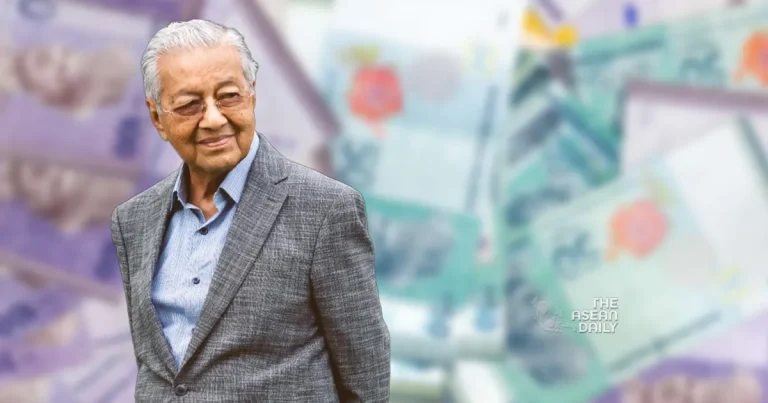2-11-2023 (KUALA LUMPUR) Former Malaysian Prime Minister Mahathir Mohamad has suggested that the country should contemplate pegging its struggling currency, the ringgit, to the US dollar. This proposal echoes the policy he implemented during the Asian financial crisis in the late 1990s. In an interview conducted on Wednesday at his office in Putrajaya, the administrative capital of Malaysia, Mahathir expressed his belief that pegging the currency could alleviate price pressures and help counter the ringgit’s decline.
The ringgit has been the worst-performing currency in emerging Asia this year, experiencing a nearly 8% slide against the US dollar. Last month, it reached a low of nearly 4.8 per dollar, marking its weakest level since January 1998, the peak of the multi-year crisis that disrupted Asian financial markets. Mahathir, who is currently 98 years old, stated in the interview that the currency could potentially slide a further 5% to a record-low of 5 per dollar. He warned of the resulting impact on the cost of living, emphasizing the need to address these challenges through a pegging strategy.
The depreciation of the ringgit has adversely affected Malaysian assets, as rising US interest rates have attracted funds back to the world’s largest economy. Bank Negara Malaysia has maintained its key interest rate at 3% since July, leading to a record discount compared to the upper limit of the US Federal Reserve’s benchmark rate. Additionally, sluggish economic growth in China, Malaysia’s largest trading partner, has weighed on the nation’s exports.
Last week, Bank Negara Malaysia Governor Abdul Rasheed Ghaffour reassured that Malaysian policymakers remain committed to ensuring a gradual adjustment of the ringgit. He stated that the central bank would intervene in the market as necessary to maintain order. However, the central bank has not provided any official comment regarding the potential implementation of a ringgit peg.
During the Asian crisis, Malaysia’s currency plummeted, putting immense pressure on the country’s foreign exchange reserves. However, Mahathir, who assumed office as prime minister in 1981, rejected a bailout from the International Monetary Fund (IMF). Instead, he introduced capital controls in September 1998 and pegged the ringgit at 3.8 per dollar, a policy that remained in place until 2005. The IMF initially criticized the ringgit peg as a “retrograde step” but later recognized it as a “stability anchor” that facilitated the country’s economic recovery.
In the interview, Mahathir reminisced about the positive response from foreign investors during the period of the ringgit peg. Since returning as prime minister for a second time in 2018, leading a reformist coalition to victory in the general election, Mahathir faced internal disagreements within the coalition, including disputes over his eventual departure, which ultimately led to the government’s downfall after a mere 21 months.
Mahathir revealed that he had previously proposed the idea of re-pegging the ringgit to the central bank upon his return to power. However, he claimed that his suggestion was dismissed due to international concerns about fixing exchange rates. Notably, Mahathir has a longstanding disdain for currency traders and once referred to billionaire investor George Soros as a “moron” for his audacious bets against the ringgit in the lead-up to the Asian crisis. In the interview, Mahathir went as far as suggesting the outlawing of currency trading, arguing that it profited from creating poverty for people.




